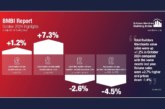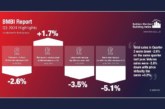
More stringent regulations governing personal water use are necessary if rising residential demand is to be met and managed in coming years. That was the message from the Builders Merchants Federation (BMF) to ministers in a consultation that closed just before the General Election was called.
Demand for water is increasing due to societal factors, including a rising population. Supply is threatened for several reasons, including increasing temperatures and decreasing rainfall, the BMF said in its response to the Department for Environment, Food and Rural Affairs (DEFRA).
DEFRA sought views on whether the current minimum standard of 125 litres per person per day for new homes in England should be changed. The BMF agreed and the optional standard of 110 litres allowed in the Building Regulations in water-stressed areas ought to apply to all new homes.
The BMF has seen forecasts by the National Infrastructure Commission that at least 3,300 million litres per day more water will be required by 2050. The BMF has also looked at figures from the Meteorological Office that show 2018 was the joint hottest English summer ever recorded, along with 2006, 2003 and 1976. 18 months ago, summer temperatures were above 30ºC for nearly a fortnight, putting 2018 in the top five driest years and top five sunniest years ever.
Brett Amphlett, BMF Policy & Public Affairs Manager, commented: “Consumers do not give water a second thought unless there is too much – namely floods – or too little – notably hosepipe bans. Information and advice only go so far. I suspect an unspoken belief held by many is that water is a basic right and residents do not care enough yet to change habits. Until there are financial consequences to water use, rising demand will not be halted by urging people to change behaviour. More stringent Building Regulations on new homes are necessary.”
Mr Amphlett noted that awareness of the link between water use and energy bills amongst the public is low. Whether for baths and showers or washing clothes and utensils, using water has implications. Metering for some properties, eliminating leaks and labelling schemes help to put over a message to consumers to make better, more informed choices when using water.
The BMF also argued that above and below-ground rainwater harvesting and greywater recycling systems should be adopted more widely — at both an individual level and on a community scale —as a way to reuse and recycle water.








